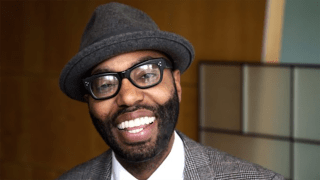Dr. Christopher Emdin, a scholar, author and impassioned advocate of educational equity, whose innovative reimagining of schooling has included using hip-hop music and culture to transform science teaching, will deliver the keynote address at USC Rossier School of Education’s commencement in May.
Emdin is a former middle and high school science and math teacher who joined the Rossier faculty this year as the Robert A. Naslund Chair in Curriculum Theory. He also is the inaugural director of youth engagement and community partnerships for the USC Race and Equity Center.
A bestselling author, he has shared his bold thinking in such books as For White Folks Who Teach in the Hood…and the Rest of Y’all Too (2016) and Ratchetdemic: Reimagining Academic Success (2021).
“Chris is an exceptional scholar and teacher educator who has enriched the national conversation about how to more effectively engage students in learning,” said USC Rossier Dean Pedro A. Noguera. “His research and scholarship have been groundbreaking and expanded the ways in which we think about who can learn science and math, and the nature of creative genius in these critical fields. We are delighted to have him as a member of our faculty.”
Emdin developed what he calls “reality pedagogy,” an approach that urges teachers to learn about their students’ complex lives and use this understanding to reexamine the curriculum and classroom culture.
“When a student is brilliant on the street corner but falling asleep in class, something is wrong with the schooling system,” he has said.
The title of his book, Ratchetdemic, is a mashup of academic and ratchet, a slang term that has taken on positive connotations, including cool, edgy and authentic. In the book Emdin proposes that educators with a ratchetdemic consciousness recognize and accept their students’ authentic selves and challenge the institutional norms that leave too many youths feeling devalued, unseen and uninspired.
Emdin, who grew up in some tough New York City neighborhoods, counts himself as one of those youths who was turned off by school. An example he cites happened in 10th grade, when he heard a loud noise and immediately ducked under his desk. His teacher accused him of clowning around and sent him to the principal’s office, unaware that Emdin, traumatized by a shooting outside his apartment building a few days earlier, had mistaken the sharp slam of a door for a gunshot.
“I really didn’t see myself in school. I didn’t find myself in school. I wasn’t inspired in school, and that’s why I shunned anything that had to do with education for a very long time,” Emdin said in an interview last year for the Carnegie Foundation for the Advancement of Teaching.
The disconnect he felt between school and the realities of his life is what eventually led him to become a teacher. “I’m driven today by the notion that I can work with schools to reimagine what education feels like for kids like me who didn’t want any parts of it,” he said. “And so I think being separated from school my whole life is what drives me to want to change schools now.”
He asks teachers to learn how to welcome students who make them uncomfortable, which may mean for example, not assuming that a student whose pants hang low is unprepared to learn. To be ratchetdemic, Emdin says, means to make space for a student’s authentic self while maintaining high academic standards and rigor.
“To hold ratchetdemic knowledge,” Emdin writes, “is to see the limits of institutional knowledge and recognize that true knowledge of self, society, and the world exists when we open our eyes to the genius that each and every student possesses.”
Emdin came to Rossier from Teachers College, Columbia University, where he was associate director of the Institute for Urban and Minority Education and director of the science education program. He started Science Genius, a program that uses hip-hop music and culture to introduce science to public high school students in New York City, Chattanooga, Toronto and Calgary in Canada, and Kingston, Jamaica.
He also founded Science Genius B.A.T.T.L.E.S. (Bring Attention to Transforming Teaching, Learning and Engagement in Science), a competition in that challenges high school students to create and perform rap songs about subjects such as gravity, evolution and the structure of DNA.
Emdin holds bachelor’s degrees in physical anthropology, biology and chemistry from Lehman College at City University of New York; a master’s degree in natural sciences from Rensselaer Polytechnic Institute; and a doctorate in urban education with a concentration in mathematics, science and technology from City University of New York.





